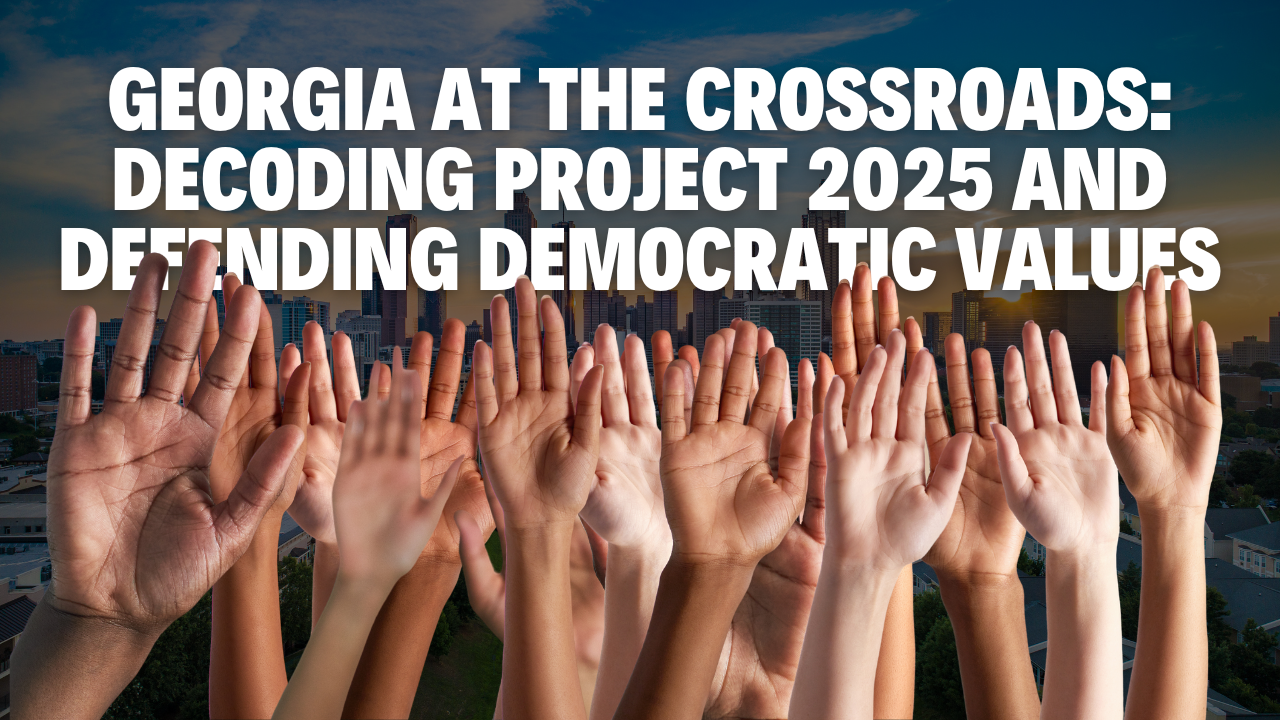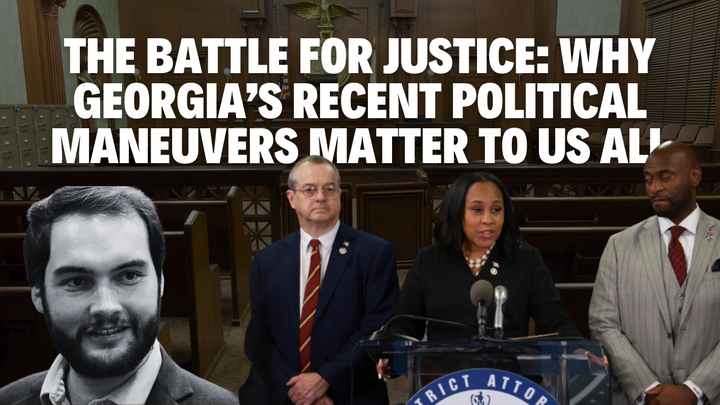Georgia at the Crossroads: Decoding Project 2025 and Defending Democratic Values

Introduction
Project 2025, as detailed in the document by Kevin D. Roberts, PhD, provides a blueprint for the conservative movement's future. This strategy seems to counter-reaction to perceived threats from evolving progressive ideologies, often encompassed under the umbrella term "woke." This term has recently become associated with social and racial justice movements, advocating for systemic changes to rectify inequalities and champion a more inclusive society.
While the document might not overtly declare it, there's an underlying sentiment suggesting that the ascendancy of these progressive movements challenges traditional conservative values and institutions. However, it's crucial to recognize the broader implications for the pillars of democracy. Democracy thrives when it represents and embraces diverse voices, irrespective of their political or ideological stances1. A strategy that intends to mute or suppress certain narratives is intrinsically at odds with democratic principles.
With its profound history and multifaceted population, Georgia has consistently been at the epicenter of defining moments in American democracy. From the 1960s Civil Rights Movement to recent electoral shifts, the state has mirrored and often influenced broader national sentiments. Therefore, any strategic directive that aims to mold the state's governance trajectory warrants careful scrutiny, especially considering its wider implications for democracy and representation.
Threat to Democracy
At its essence, democracy thrives on participation, ensuring that the rights of minority groups are protected, and their voices are heard. The core principle is that every citizen, regardless of their background, should have an equal say in the decisions that affect their lives. However, the framing of Project 2025 seems to suggest otherwise. The document implies a need to safeguard institutions from the influence of "woke culture warriors" — a term often used to describe advocates for social justice and equity. It underscores a top-down approach to governance, emphasizing the preservation of the status quo over grassroots change.
This perspective can be perceived as an attempt to suppress the voices of marginalized communities striving for equality, justice, and systemic reform. When strategies aim to limit particular narratives or ideologies, it's an antithesis to the participatory nature of democracy. Such plans, if implemented, would not only silence these voices but also foster an environment where dissent is discouraged and the majority's interests overshadow the needs and rights of minority groups. In a state as diverse as Georgia, where the tapestry of cultures and histories converge, it's especially crucial to recognize and counteract narratives that threaten to quell diverse voices. Such attempts can lead to the erosion of democratic values, creating a society where only the dominant narratives thrive at the expense of others.
Substituting "Woke" for "Black"
Language is powerful, and our chosen words can profoundly affect perception and societal attitudes. The term "woke," originally a colloquialism from Black culture, has evolved into a broader reference to awareness about social justice issues, particularly those related to race and discrimination.
In Project 2025, the term "woke" is used repeatedly in contexts that portray it as a threat. Now, imagine substituting the word "woke" with "Black." This hypothetical shift transforms the narrative into one directly targeting the Black community. Instead of challenging an ideology or movement, it seems to challenge a race. Such an interpretation can be harmful, perpetuating biases and potentially fostering an environment of distrust and discrimination.
Such narratives can be especially concerning for states like Georgia, with its deep roots in the Civil Rights Movement and a significant Black population. If influential strategies or policies are perceived to be targeting Black progressivism or Black ideologies, it can create divisions, perpetuating a cycle of mistrust and misunderstanding. It becomes imperative for Georgia residents to remain vigilant and critically analyze narratives that could further racial divides or undermine the hard-fought gains in racial equality and justice.
Furthermore, history has shown us the dangers of such substitutions. From Jim Crow to redlining, discriminatory policies were often justified using coded language that targeted specific communities without explicitly naming them. Recognizing these patterns is crucial in ensuring history doesn't repeat itself.
The Onus Isn't Solely on Black Voters
While Black voters have historically been a cornerstone of progressive movements, particularly in states like Georgia, the responsibility to champion and safeguard democracy should not rest solely on their shoulders. Democracy is a collective effort, and its defense requires the participation of all citizens.
Black voters, especially in Georgia, have shown remarkable dedication to the democratic process. Their turnout and activism have been instrumental in several pivotal elections, steering the course of policies and representation at various levels of government1. However, the issues highlighted in Project 2025 are not exclusive to the Black community. They impact many groups, all of whom have a stake in ensuring a just and equitable society.
LGBTQ+ communities, women's rights advocates, immigrant groups, and other marginalized populations also stand to be affected by strategies that promote a single narrative or ideology at the expense of others. These groups, along with Black voters, form a collective that has historically been at the forefront of advocating for social justice, equity, and reform2.
Therefore, it's essential for these groups to recognize the potential implications of strategies like Project 2025 and come together in solidarity. Their combined efforts can serve as a bulwark against attempts to limit or suppress diverse voices and narratives. By standing united, these communities can send a powerful message that the principles of democracy, equality, and justice are non-negotiable and must be upheld for everyone.
A Call to Georgia Residents
Georgia stands as a testament to the enduring spirit of democracy. From its pivotal role in the Civil Rights Movement to its influence in recent electoral outcomes, the state has showcased the profound impact of collective action and the power of the vote. The discussions surrounding Project 2025 serve as a reminder of the challenges that democracy faces, even today, and the importance of remaining vigilant.
While the document serves as a strategy for the conservative movement, its implications reach far beyond party lines. It underscores the need for all Georgians to critically analyze narratives that could impact the state's democratic fabric. The emphasis is not solely on the Black community, despite their significant role in shaping political outcomes. Regardless of their background, every Georgian has a stake in the state's future and its democratic principles.
Interest groups, advocacy organizations, and citizens must unite to defend their shared values. Whether it's the right to equitable representation, the freedom to express diverse opinions or the protection of marginalized communities, the issues at stake are universal.
Georgia residents must remember that the strength of democracy lies in its diversity and the collective will of its people. By staying informed, actively participating in the democratic process, and forging alliances with like-minded groups and individuals, Georgians can ensure that their state remains a beacon of democracy, justice, and equality.

